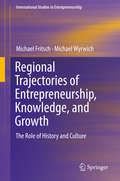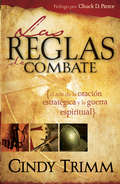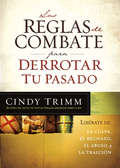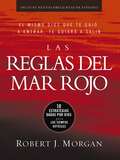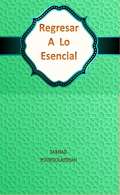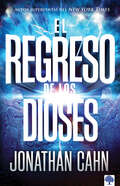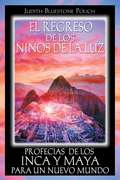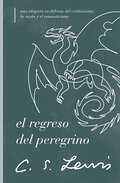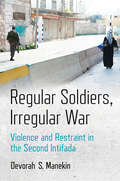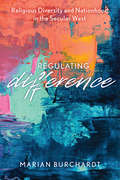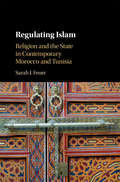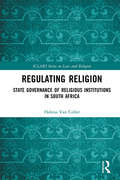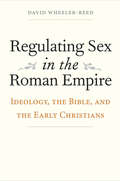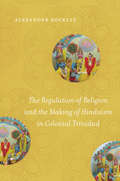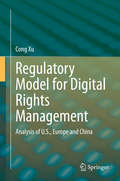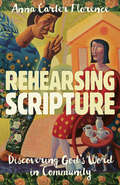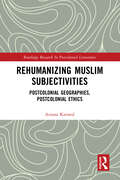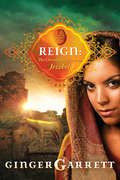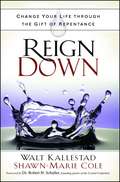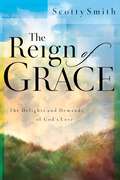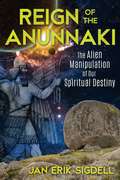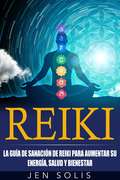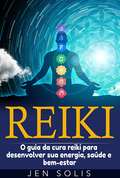- Table View
- List View
Regional Trajectories of Entrepreneurship, Knowledge, and Growth: The Role of History and Culture (International Studies in Entrepreneurship #40)
by Michael Fritsch Michael WyrwichThis book offers a dynamic perspective on regional entrepreneurship, knowledge, innovation and economic growth, with a particular focus on the role that history and culture play. The authors provide comprehensive empirical analyses offering unique insights into the spatial patterns of long-term differences of regional self-employment, new business formation, cultures of entrepreneurship, innovation activities, and development. Policy implications from the analyses and a discussion of important avenues for future research complete this unique book combining history, culture, and entrepreneurship.This is a superb book with an original, historical take on entrepreneurship and regional development. It is a landmark study on Germany showing that regional levels of entrepreneurship are persistent and resilient, despite many disruptive shocks.Ron Boschma, Utrecht University, The Netherlands, and Stavanger University, NorwayThis book presents the distilled wisdom of two leading authorities on the link between entrepreneurship and economic prosperity at a regional level. Although its prime empirical focus is on Germany there are clear lessons for scholars and policy-makers in all high-income countries.David J Storey, University of Sussex, UK
Reglas De Combate: El arte de la oración estratégica y la guerra espiritual
by Cindy TrimmCindy Trimm es una autora muy solicitada que ha vendido más de 150,000 unidades en el mercado. Este es un libro bien estructurado que incluye declaraciones para combatir al enemigo armados con el poder y la autoridad de Dios. El lector estará equipado para derrocar al reino de la oscuridad y emerger como un verdadero conquistador. Este libro ayudará a los lectores a reconocer los principados y espíritus subordinados que operan en la oscuridad y además muestra cómo exponer las armas de la guerra y ser triunfador.
Las reglas de combate para derrotar tu pasado: Libérese de la culpa, el rechazo, el abuso y la traición.
by Cindy TrimmLos libros que tratan de guerra espiritual son importantes - pero cuando usted tiene un problema específico en su vida, usted necesitará una estrategia de oración específica Todos tenemos cosas en nuestro pasado que pueden descarrilar nuestro futuro si no aprendemos cómo superarlos. Al estilo de Cindy Trimm, ésta identifica los espíritus que nos atacan a través de nuestras experiencias pasadas y proporciona escrituras específicas, oraciones y declaraciones para romper su poder. Hay una batalla espiritual, y Las reglas de combate para derrotar su pasado es un manual que lo ayudará a librar una guerra efectiva. Es el momento de tomar una posición en contra de los poderes de Satanás. Con la autoridad que le ha sido dada por Dios, usted puede entrar en el reino del poder de la oración, para romper el espíritu de la culpa, el rechazo, el abuso, la traición, y mucho más.
Las reglas del Mar Rojo: 10 estrategias dadas por Dios para los tiempos difíciles
by Robert J. MorganAl igual que Moisés y los israelitas se encontraron atrapados entre «el diablo y el profundo mar Rojo», así nosotros a veces nos vemos abrumados por los problemas de la vida. Pero Dios libró a los israelitas, y nos librará a nosotros también.Las reglas del mar Rojo revela, incluso en medio de situaciones aparentemente imposibles, la promesa de Dios de abrir un camino para nosotros. Su amorosa guía nos protegerá en medio del peligro, la enfermedad, las peleas matrimoniales, los problemas financieros... cualquier desafío que Satanás ponga en nuestro camino.Utilizando la historia de los israelitas como ejemplo, Robert Morgan ofrece diez sensatas estrategias para pasar del temor a la fe. Entre ellas: Reconocer que Dios quiere que estemos donde estamos. Reconocer al enemigo, pero mantener nuestros ojos en el Señor. Orar.La vida es difícil, especialmente para los cristianos. Es seguro que enfrentaremos dificultades, y que Dios las permitirá así como permitió que los israelitas quedaran atrapados entre los ejércitos del Faraón que se aproximaban y el mar Rojo que no podían cruzar. Pero igual de seguro es el hecho de que el mismo Dios que nos llevó hasta ahí nos hará salir. ComoLas reglas del mar Rojo aclara de modo tranquilizador, Él está en control.
Regresar a lo Esencial
by Farhad Pour-GolafshanDescripción del libro: El mundo, tal como lo conocíamos, se detuvo de la noche a la mañana, por el miedo a que un virus mortal se propague rápidamente y provoque una pandemia. Las personas fueron obligadas a permanecer encerradas en sus hogares durante un número imprevisto de semanas. Se cerraron negocios. Las consecuencias económicas aún no se sintieron del todo, pero sus perspectivas eran más mortales que las del virus. Todos comenzaron a aprender y a prestar atención a la higiene física. Esta reclusión forzada hizo que muchos volvieran a pensar sus vidas y lo que consideraban normal, y todo lo que habían dado por sentado. Para muchos, el significado de sus vidas fue cuestionado, y el enfoque comenzó a cambiar a cómo podríamos prepararnos para un evento como este o peor. Para muchos se hizo evidente que la debilidad crucial había sido la desnutrición espiritual y la negligencia; ¿Qué pasa con la higiene espiritual? Este trabajo se enfoca en cómo revivirnos espiritualmente para darnos cuenta y cumplir el verdadero significado de nuestras vidas.
El regreso de los dioses
by Jonathan Cahn"¡EL LIBRO MÁS EXPLOSIVO DE JONATHAN CAHN! ¿Será posible que tras lo que está sucediendo en Estados Unidos de América y el mundo se esconda un misterio oculto en las antiguas inscripciones de Medio Oriente? ¿Acaso están regresando a nuestro mundo las antiguas entidades conocidas como “dioses”? ¿Qué son esos seres misteriosos llamados shedim? ¿Qué es la trinidad oscura? ¿Y cuándo llegaron a Estados Unidos y al mundo? ¿Qué es la casa de los espíritus? Y ¿qué tiene que ver todo eso contigo? En El regreso de los dioses, Jonathan Cahn te llevará a lo más recóndito del mundo antiguo —Filistea, Sumeria, Asiria, Babilonia, etc.— para encontrar las piezas del rompecabezas que explican lo que está aconteciendo hoy ante la vista de todos. Más aun, Cahn revela el asombroso misterio que se extiende a lo largo de las edades —desde la antigua Akkad hasta la ciudad de Nueva York en nuestros días—, y que está cambiando al mundo. ¿Será posible que hallemos respuestas en la mitología de esos pueblos? Es más, ¿podría el misterio de los dioses haber determinado los días exactos en los que se han dictado algunas de las decisiones más trascendentales de la Corte Suprema de esta nación? Prepárate para un viaje fascinante, inolvidable y alucinante en el que la realidad es más extraña que la ficción y en el que verás al mundo como nunca antes lo viste."
El regreso de los niños de la luz: Profecías de los Inca y Maya para un nuevo mundo
by Judith Bluestone PolichA personal exploration of the conjunction between ancient Mesoamerican prophecy and New Age higher consciousness • Selected by the Independent Publisher’s Book Awards as one of the top two New Age books of the year • Explores ancient prophecies and their relevance in the contemporary world The Incan and Mayan cultures saw themselves as “children of light”--descended from celestial realms--and their prophecies foretell a time of great spiritual awakening. As the ancients predicted, the human god-seed is beginning to awaken, and modern civilization is finally beginning to perceive human potential in ways that the ancient cultures accepted as truth. Polich introduces techniques for awakening our own human potential through dreaming, meditations, and the power of sacred sites.
El regreso del peregrino: Una alegoría en defensa del cristianismo, la razón y el romanticismo
by C. S. LewisConocida como la primera novela de C. S. Lewis, esta elocuente, erudita y a menudo ingeniosa sátira de la filosofía contemporánea sigue siendo relevante más de 90 años después.Siguiendo el modelo del famoso Progreso del peregrino de John Bunyan, El regreso del peregrino de C. S. Lewis representa una serie de primicias para Lewis: el primer libro que escribió tras su conversión al cristianismo, su primer libro de ficción y el primer libro que publicó con su propio nombre. En cierto sentido, es el registro de la propia búsqueda de Lewis de sentido y satisfacción espiritual, una búsqueda que finalmente le condujo al cristianismo.Esta es la historia del peregrino Juan y su odisea hacia una isla encantadora que ha creado en él un intenso anhelo; un misterioso y dulce deseo. La persecución de este deseo por parte de Juan le lleva a través de aventuras con personas como el Sr. Ilustración, Media Media, el Sr. Mamón, el Sr. Sensato y el Sr. Humanista, y a través de lugares como el Valle de la Humillación.Aunque aquí los dragones y los gigantes son distintos de los de El progreso del peregrino de Bunyan, la alegoría de Lewis cumple la misma función de permitir al autor decir de forma sencilla y mediante la fantasía lo que de otro modo habría exigido una filosofía de la religión en toda regla.La alegoría de Lewis sigue siendo una ingeniosa sátira de las modas culturales, un vívido relato de los peligros espirituales y una historia iluminadora para generaciones de antiguos y nuevos peregrinos.The Pilgrim's RegressKnown as C. S. Lewis&’s first novel, this eloquent, erudite, and often wittysatire of contemporary philosophy is still relevant over 90 years later.Modeled after John Bunyan&’s famous Pilgrim&’s Progress, C. S. Lewis&’s Pilgrim&’s Regress represents several firsts for Lewis—the first book he wrote after his conversion to Christianity, his first book of fiction, and the first book he published under his own name. It is, in a sense, the record of Lewis&’s own search for meaning and spiritual satisfaction—a search that eventually led him to Christianity.Here is the story of the pilgrim John and his odyssey to an enchanting island which has created in him an intense longing; a mysterious, sweet desire. John's pursuit of this desire takes him through adventures with such people as Mr. Enlightenment, Media Halfways, Mr. Mammon, Mother Kirk, Mr. Sensible, and Mr. Humanist and through such cities as Thrill and Eschropolis as well as the Valley of Humiliation.Though the dragons and giants here are different from those in Bunyan's Pilgrim's Progress, Lewis's allegory performs the same function of enabling the author to say simply and through fantasy what would otherwise have demanded a full-length philosophy of religion.Lewis&’s allegory remains a witty satire on cultural fads, a vivid account of spiritual dangers, and an illuminating tale for generations of pilgrims old and new.
Regret Free Parenting
by Catherine HickemAre my kids ready for the world? Did I teach them the right things? What if I made a bad decision that affects them forever? What could I have done differently?Moms have a list of worries a mile long about their parenting. They fear they'll spend twenty years raising children--only to discover they missed investing in and teaching the things that mattered. How can any parent be sure she won't have regrets?Now an acclaimed motherhood expert teaches the principles every mother needs to confidently raise her children. Catherine Hickem shows you how to:Build companionship and trustLive peacefully in the teen yearsMaintain your position as the parentDevelop emotional intelligenceKnow the difference between control and intentionAnd much, much more.Most importantly, Hickem shows how to achieve intentional parenting. Everything important in life requires planning. And every mom knows her greatest legacy, the truest expression of her heart and hope for the world, is bound up in the way she raises her child. With a perspective rich in faith and tested by life, join Hickem and learn how you can achieve regret-free parenting!"While mothering is the hardest job we'll ever undertake, our Creator designed it to be the most rewarding, most powerful, and closest to grasping God's heart." --CATHERINE HICKEM, LCSWEndorsements: "Have you ever picked up a book and as you read it became aware that this is more than just a great book, it's a gift from God at the perfect moment? That's how I feel about Catherine's book on parenting. If you are like me, you long to love your children well through all the ages and stages of their lives. But at times, the path ahead gets a little foggy....Regret Free Parenting reminds us of what we know to be true. I am grateful for this book, I believe you will be too." ?Sheila Walsh, Women of Faith Speaker and Author of The Shelter of God's Promises and Gigi, God's Little Princess. "Catherine Hickem, wisely reminds us that as parents of teens that 'they need us to be our best when they are at their worst.' Her advice to be the 'Keeper of the Vision' and to provide affirmation to our children during the difficult teen years is exactly the right message. Regret Free Parenting is an excellent resource for all parents! ?Elayne Bennett, President and Founder of Best Friends Foundation and future author of Saving Our Daughters (Thomas Nelson 2012). Elayne is married to bestselling author, former Secretary of Education and Morning in America host, Bill Bennett.
Regular Soldiers, Irregular War: Violence and Restraint in the Second Intifada
by Devorah S. ManekinWhat explains differences in soldier participation in violence during irregular war? How do ordinary men become professional wielders of force, and when does this transformation falter or fail? Regular Soldiers, Irregular War presents a theoretical framework for understanding the various forms of behavior in which soldiers engage during counterinsurgency campaigns—compliance and shirking, abuse and restraint, as well as the creation of new violent practices.Through an in-depth study of the Israeli Defense Forces' repression of the Second Palestinian Intifada of 2000–2005, including in-depth interviews with and a survey of former combatants, Devorah Manekin examines how soldiers come both to unleash and to curb violence against civilians in a counterinsurgency campaign. Manekin argues that variation in soldiers' behavior is best explained by the effectiveness of the control mechanisms put in place to ensure combatant violence reflects the strategies and preferences of military elites, primarily at the small-unit level. Furthermore, she develops and analyzes soldier participation in three categories of violence: strategic violence authorized by military elites; opportunistic or unauthorized violence; and "entrepreneurial violence"—violence initiated from below to advance organizational aims when leaders are ambiguous about what will best serve those aims. By going inside military field units and exploring their patterns of command and control, Regular Soldiers, Irregular War, sheds new light on the dynamics of violence and restraint in counterinsurgency.
Regulating Difference: Religious Diversity and Nationhood in the Secular West
by Marian BurchardtTransnational migration has contributed to the rise of religious diversity and has led to profound changes in the religious make-up of society across the Western world. As a result, societies and nation-states have faced the challenge of crafting ways to bring new religious communities into existing institutions and the legal frameworks. Regulating Difference explores how the state regulates religious diversity and examines the processes whereby religious diversity and expression becomes part of administrative landscapes of nation-states and people’s everyday lives. Arguing that concepts of nationhood are key to understanding the governance of religious diversity, Regulating Difference employs a transatlantic comparison of the Spanish region of Catalonia and the Canadian province of Quebec to show how processes of nation-building, religious heritage-making and the mobilization of divergent interpretations of secularism are co-implicated in shaping religious diversity. It argues that religious diversity has become central for governing national and urban spaces.
Regulating Islam: Religion and the State in Contemporary Morocco and Tunisia
by Sarah J. FeuerMany countries in the Arab world have incorporated Islam into their state- and nation-building projects, naming it the 'religion of the state'. Regulating Islam offers an empirically rich account of how and why two contemporary Arab states, Morocco and Tunisia, have sought to regulate religious institutions and discourse. Drawing on a range of previously unexamined sources, Sarah J. Feuer traces and analyzes the efforts of Moroccan and Tunisian policymakers to regulate Islamic education as part of the respective regimes' broader survival strategies since their independence from French rule in 1956. Out of the comparative case study emerges a compelling theory to account for the complexities of religion-state dynamics across the Arab world today, highlighting the combined effect of ideological, political, and institutional factors on religious regulation in North Africa and the Middle East. The book makes an important and timely contribution to the on-going scholarly and policy debates concerning religion, politics, and authoritarian governance in the post-uprisings Arab landscape.
Regulating Religion: State Governance of Religious Institutions in South Africa (ICLARS Series on Law and Religion)
by Helena Van CollerThis book focuses on government regulation of religious institutions in South Africa. PART 1 explains the meaning of government regulation for religious communities by providing a brief overview of the relationship between church and state, the right to freedom of religion and the legal status of religious organisations. With reference to case examples, this section highlights the importance of religious autonomy and the right to self-determination of religious institutions and non-interference by the state in the internal affairs of the organisation. No fundamental rights are however absolute and the section concludes with a discussion on the limitation of rights and an overview of the relevant constitutional provisions and anti-discrimination laws in place relevant to religious organisations, in the context of equality and non-discrimination. PART 2 discusses in more detail the daily rights, responsibilities and freedoms associated with the right to freedom of religion within some specific spheres of society where regulation of religion has occurred or are necessary or has proved to be problematic. It includes those related to the role of religion in society; the relations between religion and state institutions; education; finance; family matters; employment law; planning law; broadcast media and general governance issues.
Regulating Sex in the Roman Empire: Ideology, the Bible, and the Early Christians
by David Wheeler-ReedA New Testament scholar challenges the belief that American family values are based on “Judeo-Christian” norms by drawing unexpected comparisons between ancient Christian theories and modern discourses Challenging the long-held assumption that American values—be they Christian or secular—are based on “Judeo-Christian” norms, this provocative study compares ancient Christian discourses on marriage and sexuality with contemporary ones, maintaining that modern family values owe more to Roman Imperial beliefs than to the bible. Engaging with Foucault’s ideas, Wheeler-Reed examines how conservative organizations and the Supreme Court have misunderstood Christian beliefs on marriage and the family. Taking on modern cultural debates on marriage and sexuality, with implications for historians, political thinkers, and jurists, this book undermines the conservative ideology of the family, starting from the position that early Christianity, in its emphasis on celibacy and denunciation of marriage, was in opposition to procreation, the ideological norm in the Greco-Roman world.
The Regulation of Religion and the Making of Hinduism in Colonial Trinidad
by Alexander RocklinHow can religious freedom be granted to people who do not have a religion? While Indian indentured workers in colonial Trinidad practiced cherished rituals, "Hinduism" was not a widespread category in India at the time. On this Caribbean island, people of South Asian descent and African descent came together—under the watchful eyes of the British rulers—to walk on hot coals for fierce goddesses, summon spirits of the dead, or honor Muslim martyrs, practices that challenged colonial norms for religion and race. Drawing deeply on colonial archives, Alexander Rocklin examines the role of the category of religion in the regulation of the lives of Indian laborers struggling for autonomy.Gradually, Indians learned to narrate the origins, similarities, and differences among their fellows' cosmological views, and to define Hindus, Muslims, and Christians as distinct groups. Their goal in doing this work of subaltern comparative religion, as Rocklin puts it, was to avoid criminalization and to have their rituals authorized as legitimate religion—they wanted nothing less than to gain access to the British promise of religious freedom. With the indenture system's end, the culmination of this politics of recognition was the gradual transformation of Hindus' rituals and the reorganization of their lives—they fabricated a "world religion" called Hinduism.
Regulatory Model for Digital Rights Management: Analysis of U.S., Europe and China
by Cong XuThis book highlights the shortcomings of the present Digital Rights Management (DRM) regulations in China. Using literature reviews and comparative analysis from theoretical and empirical perspectives, it appraises different DRM restriction regulations and practices as well as current advice on balance of interests to analyze the dilemma faced by the DRM system.This research intends to help China establish a comprehensive DRM regulatory model through comparative theoretical and empirical critiques of systems in America and Europe. A newly designed DRM regulatory model should be suitable for specific Chinese features, and should consist of government regulated, self-regulated, and even unregulated sections. The new regulation model might be an addition to existing legal structures, while self-regulations/social enforcement also would be as important as legislation based on case studies.
Rehearsing Scripture: Discovering God's Word in Community
by Anna Carter FlorenceSCRIPTURE. We can study it carefully. We can listen to sermons on it and read what the experts say about it. But in the end, says Anna Carter Florence, Scripture needs to be rehearsed and encountered—and we can do that best in community with others. In this book Florence offers concrete, practical tools for reading and rehearsing Scripture in groups. Suitable for new and seasoned Bible readers alike, Florence&’s Rehearsing Scripture invites solitary readers to become community readers as well—to gather around a shared text and encounter God anew together.
Rehearsing Scripture: Discovering God's Word in Community
by Anna Carter FlorenceSCRIPTURE. We can study it carefully. We can listen to sermons on it and read what the experts say about it. But in the end, says Anna Carter Florence, Scripture needs to be rehearsed and encountered—and we can do that best in community with others. In this book Florence offers concrete, practical tools for reading and rehearsing Scripture in groups. Suitable for new and seasoned Bible readers alike, Florence&’s Rehearsing Scripture invites solitary readers to become community readers as well—to gather around a shared text and encounter God anew together.
Rehumanizing Muslim Subjectivities: Postcolonial Geographies, Postcolonial Ethics (Routledge Research in Postcolonial Literatures)
by Aroosa KanwalRehumanizing Muslim Subjectivities: Postcolonial Geographies, Postcolonial Ethics is a timely and urgent monograph, allowing us to imagine what it feels like to be the victim of genocide, abuse, dehumanization, torture and violence, something which many Muslims in Palestine, Kashmir, Pakistan, Myanmar, Syria, Iraq and China have to endure. Most importantly, the book emphasizes the continued relevance of creative literature’s potential to intervene in and transform our understanding of a conceptual and political field, as well as advanced technologies of power and domination. The book makes a substantial theoretical contribution by drawing on wide-ranging angles and dimensions of contemporary drone warfare and its related catastrophes, postcolonial ethics in relation to the thanatopolitics of slow violence, dehumanization and the politics of death. Against the backdrop of such institutionalized and diverse acts of violence committed against Muslim communities, I call the postcolonial Muslim world ‘geographies of dehumanization’. The book investigates how ongoing legacies of contemporary forms of injustice and denial of subjecthood are represented, staged and challenged in a range of postcolonial anglophone Muslim texts, thereby questioning the idea of postcolonial ethics. One of the selling points of this book is the chapters on fictional representations by Muslim Myanmar and Uyghur writers as, to the best of my knowledge, no critical work or single authored book is available on Myanmar and Uyghur literature to date.
Reign
by Ginger GarrettBeyond the Drama, Her Heart Was RealFrom the moment her marriage to prince Ahab thrusts her into the intrigues of palace life, Jezebel's exotic beauty opens doors and her will breaks down walls. Torn from her homeland and wed to power in a strange country, Jezebel vows to create a legacy and power all her own. Some might call her a manipulative schemer, bent on having her way. But they don't know the whole story, and she was much, much worse. As she moves through the halls of power, her heart struggles between devotion to the gods she worships, the prince who loves her, and her thirst for revenge. She sparks a battle between her strangely powerless gods and the God of palace administrator Obadiah--a God who confronts her with surprising might. She will fight, though victory may cost her everything.
Reign Down: Change Your Life Through the Gift of Repentance
by Shawn-Marie Cole Walt Kallestad Robert SchullerThe Key to Heaven's Door In your possession, you have a powerful key -- a key that unlocks heaven's door and grants you instant and free access to the throne room of God. What is this key? Quite simply, it is repentance -- the kind of repentance that will change your life and cure your problems. Regardless of where life has taken you, God stands ready to take the mistakes of your past and create for you an incredible future. In the pages of this revolutionary book you'll find out how. The Gift of Repentance Is there a yearning deep in your heart that nothing can satisfy -- a craving for something more? This revolutionary book will help you explore that yearning and will powerfully demonstrate that this unsatisfied need is a part of every heart that is not yet one with God. As you receive God's gift of repentance, you will find peace, fulfillment, and a new beginning. The process is simple to start and is clearly explained inside these pages. As you bring your broken heart to God, He will fill your life with blessings galore: Peace Fulfillment Purpose Direction Meaning Satisfaction All this can be yours as you learn how to accept God's powerful gift of repentance and open your heart to all that He has for you.
The Reign of Grace: The Delignts and Demands of God's Love
by Scotty SmithPastor Scotty Smith challenges readers humbly and honestly to consider what it means to be stewards of God's grace—to live a life of obedience and service in response to His wonderful love.With breakthrough understanding, this book reconciles the disconnection between God's faithfulness to Christians and their unfaithfulness to Him.
Reign of the Anunnaki: The Alien Manipulation of Our Spiritual Destiny
by Jan Erik SigdellReveals the ongoing alien manipulation of humanity and how we can break free • Explores how the Anunnaki have maintained invisible surveillance over us and how they control our development through religion, secret societies, and catastrophes • Reveals how they feed off our energies and how this ability has allowed them to remain here on Earth as multidimensional entities, enforcing their control invisibly • Explains how they established religion to control us and how Gnostic Christianity--which came from Christ and not the Anunnaki--offers a way out of their matrix of control Cuneiform texts found on clay plates in Mesopotamia tell us about an extraterrestrial race, called the Anunnaki, who came from space to exploit our planet. Through genetic manipulation, they created modern humans from existing earthly life forms to serve them as slaves. They physically left our planet millennia ago, but as Jan Erik Sigdell reveals, their influence and control over humanity is still pervasive and significant. Sigdell explains how the Anunnaki have maintained invisible surveillance over us as well as control over how humanity develops, setting limits on our evolution and holding back our development by means of manipulation and catastrophes, including the deluge immortalized in the Bible and many other ancient myths. He shows how they still manipulate our politics and affairs via secret societies, such as the Illuminati, and the political elite, such as the Bilderberg Group. Examining ancient descriptions of the Anunnaki as entities that resemble winged reptiles or amphibians, the author also explores their diet and how they feed off blood and the energies given off by lower life forms, such as humans, when they are expressing extreme negative emotions, having sex, or dying. This energy-feeding ability has allowed them to remain here on Earth as multidimensional entities, enforcing their control invisibly. He explains how the Anunnaki established religions as tools for control, setting up the major religions with themselves as “gods” and playing them against each other to keep humanity’s attention away from ongoing Anunnaki manipulation. They have also hidden from us the existence of the true highest creator, who created the cosmos as well as the Anunnaki themselves. The author reveals how the highest creator sent a messenger called Jesus to expose the Anunnaki and show us a way out of their matrix of control through a spirituality based on love, empathy, and sacred sexuality. But the “god” of the Anunnaki defeated this messenger and replaced him with a false Christ. This led to the development of Paulinian Christianity under Anunnaki influence, as well as other parallel religions such as Islam, and the suppression and elimination of the original Christianity, Gnostic Christianity. With the discovery of hidden Gnostic texts and teachings at Nag Hammadi in 1945, the way is now paved for our release from the reign of the Anunnaki.
Reiki: la guía de sanación de Reiki para aumentar su energía, salud y bienestar
by Romina P. Piscione Jen SolisSolemos ser conscientes de que nos sentimos desequilibrados de alguna manera, pero no podemos entender por qué. El dolor, por ejemplo, es una manifestación física del desequilibrio energético. La enfermedad también puede ser un efecto secundario de esto, ya que compromete el sistema inmune. La curación con Reiki es algo que se puede practicar de forma segura todos los días, y si no se siente bien, el Reiki puede ayudar a que se recupere y se sienta mejor más rápido. La Guía de sanación de Reiki puede ayudarle a lograr un mejor bienestar físico y mental a través de las técnicas que estamos a punto de mostrarle. Lo bueno del Reiki es que incluso cuando se enfoca en sanar una parte de su vida, sus esfuerzos afectarán todas las partes de su vida y las ayudará a regresar naturalmente a un equilibrio óptimo. Una vez que esté familiarizado con el proceso de equilibrio, también puede dar energía a otros mediante la utilización de técnicas de sintonización que manipulan el campo de energía y le permiten interactuar directamente con ella. Hay muchas técnicas orientales que dependen de la energía Qi, ¿por qué elegir Reiki? Descubrirá todo eso y más aquí. En este libro encontrará las respuestas a estas preguntas y más. Algunas de las preguntas y temas incluidos son: Los fundamentos del Reiki Curación con Reiki Energía Qi Chakras Claros y cristales Clarividencia Clarisentencia Clariaudiencia Claricognisencia Practicar Reiki El procedimiento de sintonización Nivel 2 Nivel 3 /Master Reiki Escaneos corporales Escaneo de aura Escaneo de péndulo ¡Y más! ¡No dude en recoger su copia hoy!
Reiki: O guia da cura reiki para desenvolver sua energia, saúde e bem-estar
by Jen SolisFrequentemente temos consciência de que estamos desequilibrados de alguma forma mas não conseguimos entender porquê. Dor, por exemplo, é uma manifestação física de desequilíbrio energético. Doenças também podem ser um efeito colateral, já que o sistema imunológico é comprometido. A cura Reiki é algo que pode ser praticado com segurança no dia-a-dia e se você não se sente bem, o Reiki pode ajudá-lo a se recuperar mais rapidamente. O guia da cura reiki pode ajudá-lo a alcançar bem-estar físico e mental através de técnicas que vamos lhe mostrar. A melhor parte do Reiki é que mesmo que você esteja focado em curar uma parte de sua vida, os seus esforços irão afetar todas as partes de sua vida e naturalmente retornar para o equilíbrio. Uma vez que você estiver familiarizado com o processo de equilíbrio, você pode inclusive doar energia a outros usando as técnicas de sintonização que manipulam o campo energético e permitem que você interaja com a energia diretamente. Há muitas técnicas orientais que trabalham com a energia Qi, então por que escolher o Reiki? Você descobrirá isto e mais neste livro.Neste livro você encontrará as respostas para essas perguntas e mais. Algumas das questões e tópicos são: Reiki básico Cura com Reiki Energia Qi Chakras Claridades e cristais Clarividência Clarisciência Clariaudiência Claricognição Praticando Reiki O processo de sintonizaçãp Nível 2 Nível 3/Mestre Reiki Escaneamento do corpo (body scans) Escaneamento de Auras Escaneamento com pêndulos E mais!
